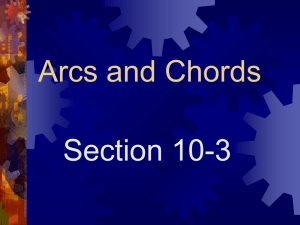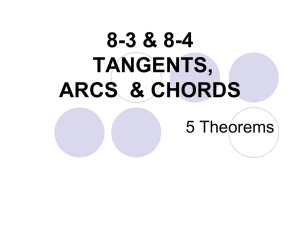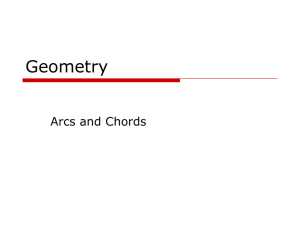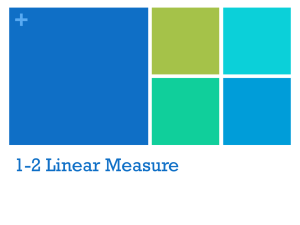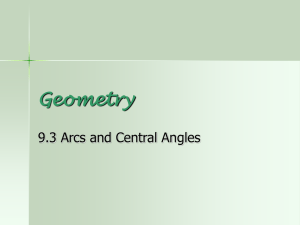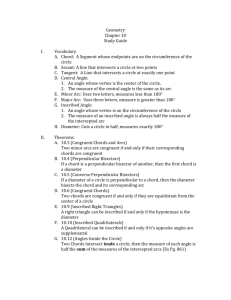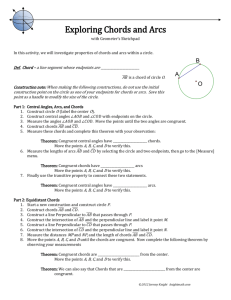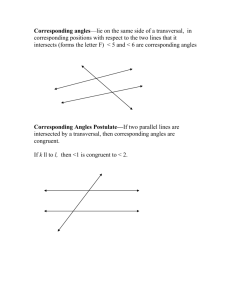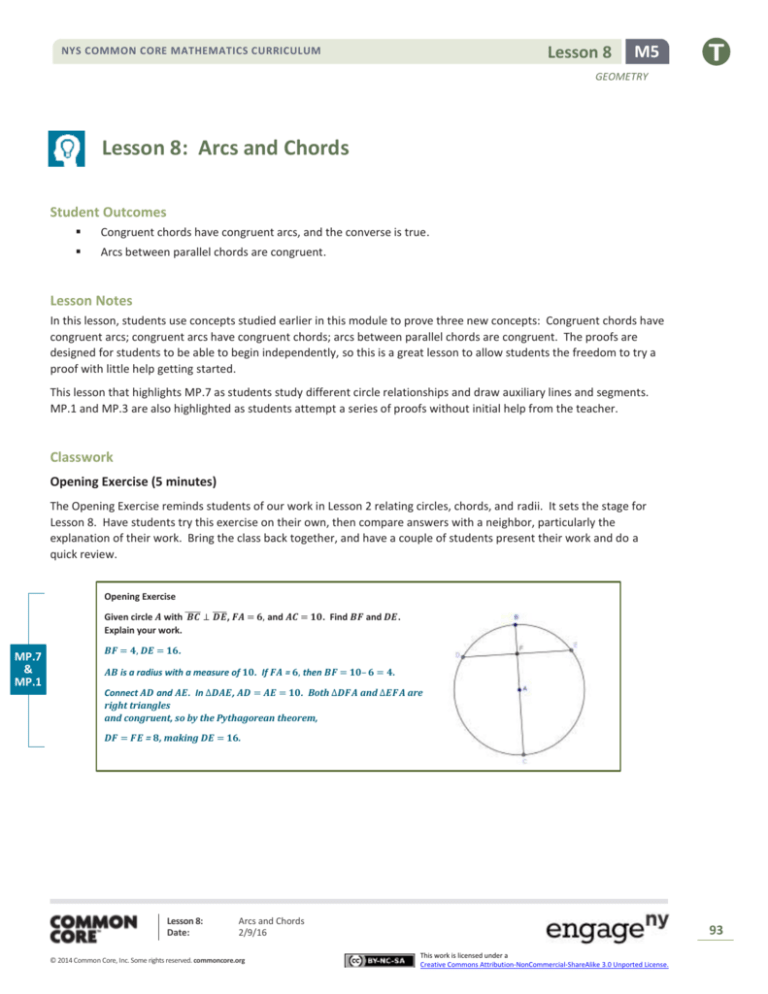
Lesson 8
NYS COMMON CORE MATHEMATICS CURRICULUM
M5
GEOMETRY
Lesson 8: Arcs and Chords
Student Outcomes
Congruent chords have congruent arcs, and the converse is true.
Arcs between parallel chords are congruent.
Lesson Notes
In this lesson, students use concepts studied earlier in this module to prove three new concepts: Congruent chords have
congruent arcs; congruent arcs have congruent chords; arcs between parallel chords are congruent. The proofs are
designed for students to be able to begin independently, so this is a great lesson to allow students the freedom to try a
proof with little help getting started.
This lesson that highlights MP.7 as students study different circle relationships and draw auxiliary lines and segments.
MP.1 and MP.3 are also highlighted as students attempt a series of proofs without initial help from the teacher.
Classwork
Opening Exercise (5 minutes)
The Opening Exercise reminds students of our work in Lesson 2 relating circles, chords, and radii. It sets the stage for
Lesson 8. Have students try this exercise on their own, then compare answers with a neighbor, particularly the
explanation of their work. Bring the class back together, and have a couple of students present their work and do a
quick review.
Opening Exercise
̅̅̅̅, 𝑭𝑨 = 𝟔, and 𝑨𝑪 = 𝟏𝟎. Find 𝑩𝑭 and 𝑫𝑬.
Given circle 𝑨 with ̅̅̅̅̅
𝑩𝑪 ⊥ 𝑫𝑬
Explain your work.
MP.7
&
MP.1
𝑩𝑭 = 𝟒, 𝑫𝑬 = 𝟏𝟔.
𝑨𝑩 is a radius with a measure of 𝟏𝟎. If 𝑭𝑨 = 𝟔, then 𝑩𝑭 = 𝟏𝟎– 𝟔 = 𝟒.
Connect 𝑨𝑫 and 𝑨𝑬. In ∆𝑫𝑨𝑬, 𝑨𝑫 = 𝑨𝑬 = 𝟏𝟎. Both ∆𝑫𝑭𝑨 and ∆𝑬𝑭𝑨 are
right triangles
and congruent, so by the Pythagorean theorem,
𝑫𝑭 = 𝑭𝑬 = 𝟖, making 𝑫𝑬 = 𝟏𝟔.
Lesson 8:
Date:
Arcs and Chords
2/9/16
© 2014 Common Core, Inc. Some rights reserved. commoncore.org
93
This work is licensed under a
Creative Commons Attribution-NonCommercial-ShareAlike 3.0 Unported License.
Lesson 8
NYS COMMON CORE MATHEMATICS CURRICULUM
M5
GEOMETRY
Exploratory Challenge (12 minutes)
Scaffolding:
In this example, students will use what they have learned about the relationships between
chords, radii, and arcs to prove that congruent chords have congruent arcs and congruent
minor arcs have congruent chords. They will then extend this to include major arcs. We
are presenting the task and then letting students think through the first proof. Give
students time to struggle and talk with their groups. This is not a difficult proof and can be
done with concepts from Lesson 2 that they are familiar with or by using rotation. Once
groups finish and talk about the first proof, they then do two more proofs that are similar.
Walk around, and give help where needed, but not too quickly.
Display the theorems,
axioms, and definitions
that we have studied in
this module on a word
wall.
Chorally repeat the
definitions as a class.
Display the picture below to the class.
Scaffolding:
Tell me what you see in this diagram.
If groups are struggling with the
proof, give them the following
leading questions and steps:
Draw a picture of the problem.
Draw two triangles, one joining the
center to each chord.
What is true about the sides of the
triangle connected to the center of
the circle?
Are the triangles congruent? How?
What does that mean about the
central angles?
If we say the central angle has a
measure of x°, what is the measure
of each chord?
Think about what we know about
rotating figures, will that help us?
Try drawing a picture.
A circle, a chord, a minor arc, a major arc.
What do you notice about the chord and the minor arc?
They have the same endpoints.
̂ is subtended by chord ̅̅̅̅
We say that arc 𝐴𝐵
𝐴𝐵 . Can you repeat that
with me?
̂ is subtended by chord ̅̅̅̅
Arc 𝐴𝐵
𝐴𝐵 .
What do you think we mean by the word “subtended”?
The chord cuts the circle and forms the arc. The chord and
arc have the same endpoints.
̂?
Display circle at right. What can we say about arc 𝐶𝐷
̂ is subtended by chord ̅̅̅̅
Arc 𝐶𝐷
𝐶𝐷 .
̂ and
If 𝐴𝐵 = 𝐶𝐷, what do you think would be true about 𝑚𝐴𝐵
̂
𝑚𝐶𝐷 ?
They are equal (congruent).
Lesson 8:
Date:
Arcs and Chords
2/9/16
© 2014 Common Core, Inc. Some rights reserved. commoncore.org
94
This work is licensed under a
Creative Commons Attribution-NonCommercial-ShareAlike 3.0 Unported License.
Lesson 8
NYS COMMON CORE MATHEMATICS CURRICULUM
M5
GEOMETRY
Put students in heterogeneous groups of three, and present the task. Set up a 5-minute check to be sure that groups are
on the right path and to give ideas to groups who are struggling. Have groups show their work on large paper or poster
board and display work, then have a whole class discussion showing the various ways to achieve the proof.
With your group, prove that if the chords are congruent, the arcs subtended by those chords are congruent.
Now prove that in a circle congruent minor arcs have congruent chords.
Some groups will use rotations and others similar triangles similar to the work that was done in Lesson
2. Both ways are valid and sharing will expose students to each method.
Students should easily see that the process is almost the same, and that it is indeed true.
Do congruent major arcs have congruent chords too?
Since major arcs are the part of the circle not included in the minor arc, if minor arcs are congruent,
360° minus the measure of the minor arc will also be the same.
Exercise 1 (5 minutes)
Have students try Exercise 1 individually, and then do a pair-share. Wrap up with a quick whole class discussion.
Exercises
1.
̂ = 𝟓𝟒° and ∠𝑪𝑫𝑩 ≅ ∠𝑫𝑩𝑬, find 𝒎𝑫𝑬
̂ . Explain
Given circle 𝑨 with 𝒎𝑩𝑪
your work.
̂ = 𝟓° . 𝒎∠𝑪𝑨𝑩 = 𝟓° because the central angle has the same
𝒎𝑫𝑬
measure as its subtended arc. 𝒎∠𝑪𝑫𝑩 = 𝟐𝟕° because an inscribed angle
has half the measure of the central angle with the same inscribed arc.
̂ = 𝟓𝟒° because it is double the angle
Since ∠𝑪𝑫𝑩 ≅ ∠𝑫𝑩𝑬, 𝒎𝑫𝑬
inscribed in it.
Lesson 8:
Date:
Arcs and Chords
2/9/16
© 2014 Common Core, Inc. Some rights reserved. commoncore.org
95
This work is licensed under a
Creative Commons Attribution-NonCommercial-ShareAlike 3.0 Unported License.
Lesson 8
NYS COMMON CORE MATHEMATICS CURRICULUM
M5
GEOMETRY
Example 1 (5 minutes)
Scaffolding:
In this example, students prove that arcs between parallel chords are congruent. This is a
teacher led example. Students will need a compass and
straight edge to construct a diameter and a copy of the circle below.
Display the picture at right to the class.
What do you see in this diagram?
A circle, two arcs, a pair of parallel chords
What looks to be true about the arcs?
They appear to be congruent.
This is true, and here is the theorem: In a circle, arcs between
parallel chords are congruent.
Repeat that with me.
Let’s prove this together. Construct a diameter perpendicular to
the parallel chords.
Students construct the perpendicular diameter.
The diameter bisects each chord.
Reflect across the diameter (or fold on the diameter). What happens to the endpoints?
In a circle, arcs between parallel chords are congruent.
What does this diameter do to each chord?
For advanced learners,
display the picture below,
and ask them to prove the
theorem without the
provided questions, and
then present their proofs
in class.
The reflection takes the endpoints on one side to the endpoints on the other side. It therefore takes arc
to arc. Distances from the center are preserved.
What have we proven?
Arcs between parallel chords are congruent.
̅̅̅̅
Draw 𝐶𝐷 . Can you think of another way to prove this theorem using properties of angles formed by parallel
lines?
̂ = 𝑚𝐵𝐷
̂ both
𝑚∠𝐵𝐶𝐷 = 𝑚∠𝐸𝐷𝐶 because alternate interior angles are congruent. This means 𝑚𝐶𝐸
have inscribed angles of the same measure, so the arc angle measures are congruent and twice the
measure of their inscribed angles.
Lesson 8:
Date:
Arcs and Chords
2/9/16
© 2014 Common Core, Inc. Some rights reserved. commoncore.org
96
This work is licensed under a
Creative Commons Attribution-NonCommercial-ShareAlike 3.0 Unported License.
Lesson 8
NYS COMMON CORE MATHEMATICS CURRICULUM
M5
GEOMETRY
Exercise 2 (5 minutes)
Scaffolding:
Have students work on Exercise 2 in pairs. This exercise requires use of all concepts
studied today. Pull the class back together to share solutions. Use this as a way to assess
student understanding.
2.
If two arcs in a circle have the same measure, what can you say about the quadrilateral
formed by the four endpoints? Explain.
Review the properties of
quadrilaterals.
For students who can’t
picture the figure, provide
them with this diagram.
If the arcs are congruent, their endpoints can be joined to form chords that are parallel
̅̅̅̅‖𝑫𝑬
̅̅̅̅.).
(𝑩𝑪
̅̅̅̅).
̅̅̅̅̅‖𝑪𝑬
The chords subtending the congruent arcs are congruent (𝑩𝑫
A quadrilateral with one pair of opposite sides parallel and the other pair of sides congruent
is an isosceles trapezoid.
Exercises 3–5 (5 minutes)
3.
̂ and 𝑬𝑫
̂.
Find the angle measure of 𝑪𝑫
̂ = 𝟏𝟑𝟎°, 𝒎𝑬𝑫
̂ = 𝟓𝟎°
𝒎𝑪𝑫
4.
̂ = 𝒎𝑬𝑫
̂ : 𝒎𝑩𝑫
̂ = 𝟏: 𝟐: 𝟒. Find
̂ and 𝒎𝑩𝑪
̂ : 𝒎𝑬𝑪
𝒎𝑪𝑩
a.
𝒎∠𝑩𝑪𝑭
𝟒𝟓°
b.
𝒎∠𝑬𝑫𝑭
𝟗𝟎°
c.
𝒎∠𝑪𝑭𝑬
𝟏𝟑𝟓°
Lesson 8:
Date:
Arcs and Chords
2/9/16
© 2014 Common Core, Inc. Some rights reserved. commoncore.org
97
This work is licensed under a
Creative Commons Attribution-NonCommercial-ShareAlike 3.0 Unported License.
NYS COMMON CORE MATHEMATICS CURRICULUM
Lesson 8
M5
GEOMETRY
5.
̅̅̅̅
̂ = 𝟏: 𝟑: 𝟓. Find
̂ : 𝒎𝑫𝑬
̂ : 𝒎𝑬𝑪
𝑩𝑪 is a diameter of circle 𝑨. 𝒎𝑩𝑫
̂
𝒎𝑩𝑫
a.
𝟐𝟎°
̂
𝒎𝑫𝑬𝑪
b.
𝟏𝟔𝟎°
̂
𝒎𝑬𝑪𝑩
c.
𝟐𝟖𝟎°
Closing (3 minutes)
Have students do a 30-second Quick Write on what they have learned in this lesson about chords and arcs. Pull the class
together to review, and have them add these to the circle graphic organizer started in Lesson 2.
Congruent chords have congruent arcs.
Congruent arcs have congruent chords.
Arcs between parallel chords are congruent.
Lesson Summary
THEOREMS:
Congruent chords have congruent arcs.
Congruent arcs have congruent chords.
Arcs between parallel chords are congruent.
Exit Ticket (5 minutes)
Lesson 8:
Date:
Arcs and Chords
2/9/16
© 2014 Common Core, Inc. Some rights reserved. commoncore.org
98
This work is licensed under a
Creative Commons Attribution-NonCommercial-ShareAlike 3.0 Unported License.
Lesson 8
NYS COMMON CORE MATHEMATICS CURRICULUM
M5
GEOMETRY
Name
Date
Lesson 8: Arcs and Chords
Exit Ticket
1.
Given circle 𝐴 with radius 10, prove 𝐵𝐸 = 𝐷𝐶.
2.
̂.
Given the circle at right, find 𝑚𝐵𝐷
Lesson 8:
Date:
Arcs and Chords
2/9/16
© 2014 Common Core, Inc. Some rights reserved. commoncore.org
99
This work is licensed under a
Creative Commons Attribution-NonCommercial-ShareAlike 3.0 Unported License.
Lesson 8
NYS COMMON CORE MATHEMATICS CURRICULUM
M5
GEOMETRY
Exit Ticket Sample Solutions
1.
Given circle 𝑨 with radius 𝟏𝟎, prove 𝑩𝑬 = 𝑫𝑪.
𝒎∠𝑩𝑨𝑬 = 𝒎∠𝑫𝑨𝑪 (vertical angles are congruent)
̂ (arcs are equal in degree measure to their inscribed central
̂ = 𝒎𝑫𝑪
𝒎𝑩𝑬
angles)
𝑩𝑬 = 𝑫𝑪 (chords are equal in length if they subtend congruent arcs)
2.
̂.
Given the circle at right, find 𝒎𝑩𝑫
𝟔𝟎°
Problem Set Sample Solutions
Problems 1–3 are straightforward and easy entry. Problems 5–7 are proofs and may be challenging for some students.
You may consider only assigning some problems or allowing student choice while requiring some problems of all
students.
1.
Find
a.
̂
𝒎𝑪𝑬
𝟕𝟎°
b.
̂
𝒎𝑩𝑫
𝟕𝟎°
c.
̂
𝒎𝑬𝑫
𝟒𝟎°
Lesson 8:
Date:
Arcs and Chords
2/9/16
© 2014 Common Core, Inc. Some rights reserved. commoncore.org
100
This work is licensed under a
Creative Commons Attribution-NonCommercial-ShareAlike 3.0 Unported License.
NYS COMMON CORE MATHEMATICS CURRICULUM
Lesson 8
M5
GEOMETRY
2.
̂ = 𝒎𝑬𝑫
̂ , and 𝒎∠𝑪𝑨𝑬 = 𝟑𝟐°.
In circle 𝑨, ̅̅̅̅
𝑩𝑪 is a diameter, 𝒎𝑪𝑬
a.
Find 𝒎∠𝑪𝑨𝑫.
𝟔𝟒°
b.
Find 𝒎∠𝑨𝑫𝑪.
𝟓𝟖°
3.
̂ = 𝒎𝑬𝑫
̂ , and ̅̅̅̅
̅̅̅̅. Find
In circle 𝑨, ̅̅̅̅
𝑩𝑪 is a diameter, 𝟐𝒎𝑪𝑬
𝑩𝑪‖𝑫𝑬
𝒎∠𝑪𝑫𝑬.
𝟐𝟐. 𝟓°
4.
̅̅̅̅ is a diameter and 𝑪𝑬
̂ = 𝟔𝟖° .
In circle 𝑨, 𝑩𝑪
a.
̂.
Find 𝒎𝑪𝑫
𝟔𝟖°
b.
Find 𝒎∠𝑫𝑩𝑬.
𝟔𝟖°
c.
Find 𝒎∠𝑫𝑪𝑬
𝟏𝟏𝟐°
Lesson 8:
Date:
Arcs and Chords
2/9/16
© 2014 Common Core, Inc. Some rights reserved. commoncore.org
101
This work is licensed under a
Creative Commons Attribution-NonCommercial-ShareAlike 3.0 Unported License.
NYS COMMON CORE MATHEMATICS CURRICULUM
Lesson 8
M5
GEOMETRY
5.
̂ ≅ 𝑬𝑫
̂ . Prove ̅̅̅̅
In the circle given, 𝑩𝑪
𝑩𝑬 ≅ ̅̅̅̅
𝑫𝑪
̅̅̅̅
Join 𝑪𝑬.
𝑩𝑪 = 𝑬𝑫 (congruent arcs have chords equal in length)
𝒎∠𝑪𝑩𝑬 = 𝒎∠𝑬𝑫𝑪 (angles inscribed in same arc are equal in
measure) 𝒎∠𝑩𝑪𝑬 = 𝒎∠𝑫𝑬𝑪 (angles inscribed in congruent arcs
are equal in measure)
∆𝑩𝑪𝑬 ≅ ∆𝑫𝑬𝑪 (AAS)
̅̅̅̅
𝑩𝑬 ≅ ̅̅̅̅
𝑫𝑪 (corresponding sides of congruent triangles are
congruent)
6.
̅̅̅̅, show 𝑩𝑫
̂ ≅ 𝑫𝑬
̂.
Given circle 𝑨 with ̅̅̅̅
𝑨𝑫‖𝑪𝑬
Join ̅̅̅̅̅
𝑩𝑫, ̅̅̅̅
𝑫𝑬, ̅̅̅̅
𝑨𝑬.
̅̅̅̅ = 𝑨𝑬
̅̅̅̅ = 𝑨𝑫
̅̅̅̅ = 𝑨𝑩
̅̅̅̅ (radii)
𝑨𝑪
∠𝑨𝑬𝑪 ≅ ∠𝑨𝑪𝑬, ∠𝑨𝑬𝑫 ≅ ∠𝑨𝑫𝑬, ∠𝑨𝑫𝑩 ≅ ∠𝑨𝑩𝑫 (base angles
of isosceles triangles are congruent)
∠𝑨𝑬𝑪 ≅ ∠𝑬𝑨𝑫 (Alternate interior angles are congruent)
𝒎∠𝑨𝑫𝑬 + 𝒎∠𝑫𝑬𝑨 + 𝒎∠𝑬𝑨𝑫 = 𝟏𝟖𝟎° (sum of angles of ∆)
𝟑𝒎∠𝑨𝑬𝑫 = 𝟏𝟖° (substitution)
𝒎∠𝑨𝑬𝑫 = 𝟔𝟎° ∆𝑩𝑨𝑫 ≅ ∆𝑫𝑨𝑬 ≅ ∆𝑬𝑨𝑪 (SAS)
𝑩𝑫 = 𝑫𝑬 (corresponding parts of congruent triangles)
̂ ≅ 𝑫𝑬
̂ (arcs subtended by congruent chords)
𝑩𝑫
Lesson 8:
Date:
Arcs and Chords
2/9/16
© 2014 Common Core, Inc. Some rights reserved. commoncore.org
102
This work is licensed under a
Creative Commons Attribution-NonCommercial-ShareAlike 3.0 Unported License.
NYS COMMON CORE MATHEMATICS CURRICULUM
Lesson 8
M5
GEOMETRY
7.
̂ ≅ 𝑩𝑫
̂ and 𝒎∠𝑪𝑨𝑫 = 𝟓𝟒°.
In circle 𝑨, ̅̅̅̅
𝑨𝑩 is a radius and 𝑩𝑪
Find 𝒎∠𝑨𝑩𝑪. Complete the proof.
𝑩𝑪 = 𝑩𝑫
_____________________________
𝒎∠_____ = 𝒎∠_____
_____________________________
𝒎∠𝑩𝑨𝑪 + 𝒎∠𝑪𝑨𝑫 + 𝒎∠𝑩𝑨𝑫 = _______________________
𝟐𝒎∠_____ + 𝟓𝟒° = 𝟑𝟔𝟎°
________________________
𝒎∠𝑩𝑨𝑪 = __________
𝑨𝑩 = 𝑨𝑪
__________________________
𝒎∠_____ = 𝒎∠_____
__________________________
𝟐𝒎∠𝑨𝑩𝑪 + 𝒎∠𝑩𝑨𝑪 = _____
___________________________
𝒎∠𝑨𝑩𝑪 = _____
Chords of congruent arcs; 𝑩𝑨𝑪, 𝑩𝑨𝑫, angles inscribed in congruent arcs are congruent; 𝟑𝟔𝟎°, circle; 𝑩𝑨𝑪; 𝟏𝟓𝟑°;
radii; 𝑨𝑩𝑪 , 𝑨𝑪𝑩, base angles of isosceles; 𝟏𝟖𝟎°, angles of triangle equal 𝟏𝟖𝟎°; 𝟏𝟑. 𝟓°
Lesson 8:
Date:
Arcs and Chords
2/9/16
© 2014 Common Core, Inc. Some rights reserved. commoncore.org
103
This work is licensed under a
Creative Commons Attribution-NonCommercial-ShareAlike 3.0 Unported License.

